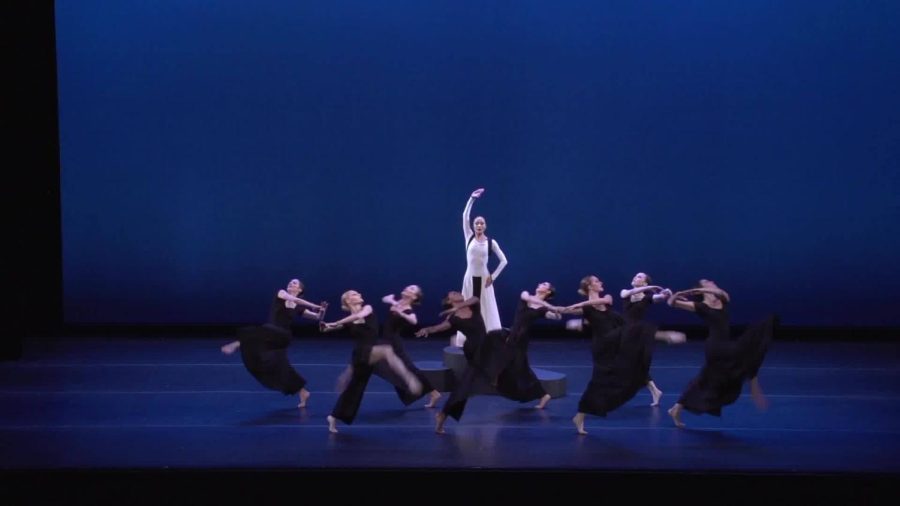On Saturday night, the Tillis Performance Hall was unusually crowded with patrons eager to watch the esteemed Martha Graham Dance Company take the stage at the University of Massachusetts. The company was set to perform three works, old and new, that highlight both the late choreographer’s vision and the direction of the company under the current artistic direction of Janet Eilber. The three works being performed were “Dark Meadow Suite,” “Get Up, My Daughter” and “Canticle for Innocent Comedians.”
“Dark Meadow Suite” was the only work performed that evening that was choreographed by Martha Graham. One of her most widely known and important works, “Dark Meadow,” premiered in 1946, while the piece performed at UMass premiered in 2016 as a shortened version consisting of highlights from the larger work. Eilber introduced the suite as a tale of “finding oneself, one’s community and one another.” For a work that made waves in the dance world at the time of its premiere, it felt quite ordinary in 2023. That is not to say it was uninteresting or unimpressive, as the dancers still performed the taxing and technically intricate choreography with all the graceful expression expected of the renowned company.
The piece began with feminine lead (Anne Souder) searching for community among an ensemble of women, fluttering on the outskirts of their posse. She then finds companionship with the male presenting lead (Lloyd Knight), engaging in an athletic duet filled with partnered contortions and delicately balanced lifts. Eventually, the couple is joined again by the ensemble, and each woman is paired off with a male dancer. The six sets of partners perform sexually charged partnering choreography, with heavily gendered roles and power dynamics. While conceptually it has lost its novelty and now seems outdated or even redundant, it is important to remember the culture in which it gained notoriety originally and to keep in mind the historical contexts of such an explicitly provocative work in a burgeoning post-war America.
The second piece performed was a brand-new work-in-progress that is set to premiere at the Joyce Theatre in New York City on April 18. Entitled “Get Up, My Daughter,” it is an abstract exploration of the “beauty and power of the feminine,” according to the program, and is set to a recording by the Bulgarian State Female Choir. It is filled with sweeping, expressive movements and reaching moments of agony. The concept of this piece was thrilling within the pages of the program, yet fell flat in delivery in large part due to the inclusion of a male role (Richard Villaverde) within a piece that would have been more impactful with an entirely feminine cast.
One of the women spent much of the piece partnering with him, being either pushed and pulled around the stage or attempting to avoid her partner entirely. These moments, while evocative and poignant, were dulled by the knowledge that the piece was intended to highlight feminine strength and power. It seemed instead to draw attention to male aggression without the same focus on resisting and overcoming this violence.
Where the first two works lacked conceptual clarity and rigor, the third work was a revelation. “Canticle for Innocent Comedians” is a collection of vignettes by different choreographers inspired by the complex interconnectedness of nature and the cosmos. The piece is a reimagining of a 1952 Martha Graham piece of the same name that is entirely lost to record, except for a single duet — “moon.” The current version premiered in 2022 and relishes its thematic elements, with movements and color-coded costuming reminiscent of each part of nature being represented.
“Sun,” “Earth,” “Wind,” “Water,” “Fire,” “Moon,” “Stars” and “Death/Rebirth” are a series of solos, duets and trios that truly embody the conceived spirit of each element. In “Sun,” the dancer’s (Lorenzo Pagano) movements are large and reaching, while the two women in “Earth” (Anne Souder, Natasha M. Diamond-Walker) stay grounded and low. “Wind” (Laurel Dalley Smith) floats across the stage with airy traveling steps, and “Water’s” male duet (Alessio Crognale, Lloyd Knight) flows with both energy and tranquility.
The three women of “Fire” (Marzia Memoli, Anne Souder and Leslie Andrea Williams) are powerful and aggressive in the sharp staccato of their piece, and the duet partners in “Moon” (So Young An, Jacob Larsen) are equal parts romantic and mysterious. “Stars” (Alessio Crognale and Marzia Memoli) is a duet with tender partnering and shimmering emotion. “Death/Rebirth” (Jacob Larsen) is a solo that is as teeming with visceral expression as one might imagine from its existential premise.
The transitions between vignettes are also of note, as each incorporated a different combination of the dancers to join the previous performers on stage for a brief ensemble interlude which then ebbed away to begin the next segment. Underscoring the interconnectedness of nature, these transitions were almost as important to the work as each spot-lit component.
When the final curtain fell, the audience was left with a whirl of varying emotional and intellectual factors to ponder on the rainy trek back to their cars. Though this was not the most ambitious or complex dance performance I have watched, it did satiate my constant itch for the transcendent experience of good art. Dance is an elaborate contortion of the human body into artist, muse, storyteller and subject at once, conveying depths of human experience that no language of the tongue could hope to grasp.
Jamie Long can be reached [email protected]



















